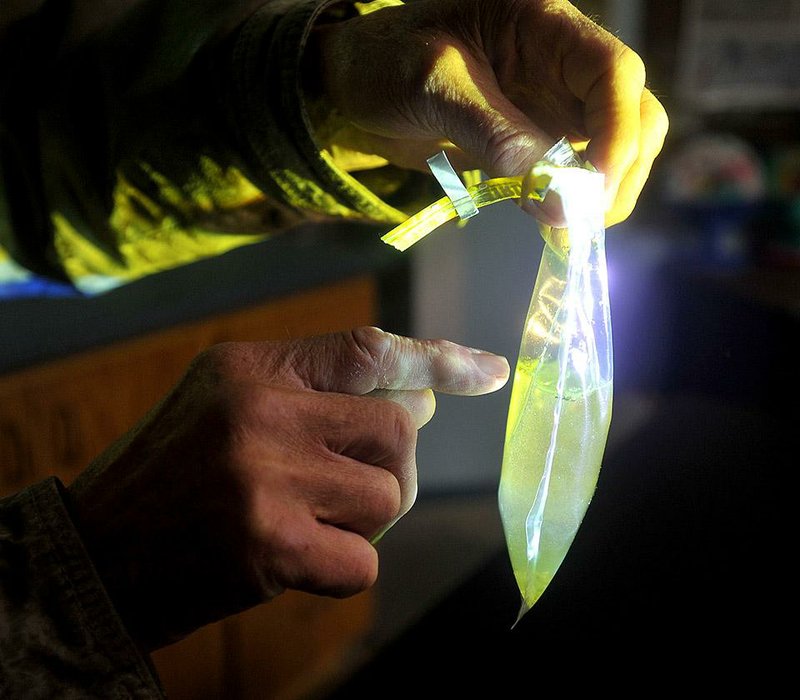Russell Rhodes holds up a water sample he pulled from Lake Fayetteville and points to little green specks floating in the jar.
"That is algae," said Rhodes, a former biologist and college professor.
Rhodes is one of thousands of citizen scientists in the state who volunteer to collect or manage data, often with an environmental focus. On Friday, Rhodes was volunteering for the Lake Fayetteville Watershed Partnership, which for 13 years has been collecting data on trash that's in water. Only recently has the group started collecting water data that includes types of algae.
Citizen science has boomed in the state and nationally in the past decade. The term "citizen science" was added to the Oxford Dictionary in June, according to the dictionary company's website.
The Lake Fayetteville Watershed Partnership will eventually pass the data on to the Stream Team program organized by the Arkansas Game and Fish Commission. The Stream Team program is made up of volunteer groups across the state that practice citizen science.
"It is a little bit difficult to actually describe what a stream team is and does," said Stephen O'Neal, stream team organizer. "Some collect litter data, some are only interested in doing chemistry, others only monitor from a biological standpoint."
Data collected by the teams are sent to the Arkansas Game and Fish Commission, O'Neal said. The information is then stored in a database. Data have been used in the past to find sources of pollution, he said.
If a team notices something in the data that could indicate a problem, the appropriate state agency is contacted for help, O'Neal said.
"That can lead to some investigating," O'Neal said. "We have had stream teams find things that were not quite up to snuff. There may have been some illegal dumping or accidental discharge."
Rhodes is concerned about microcystis aeruginosa and anabaena spiroides algae that he found recently at Lake Fayetteville.
Both algae can release toxins that cause illness in humans and dogs, Rhodes said. They can also affect aquatic life.
"I want to make sure water quality is good," Rhodes, 75, said. "If it is not right, people need to know about it."
Rhodes didn't have enough data Friday to say whether Lake Fayetteville's algae levels are cause for concern.
Currently data collected by Stream Teams are not accessible to the public in a combined database. Without a comprehensive information source, data collection is sometimes duplicated by another Stream Team. It can also mean that wider trends in data may be missed.
There are plans to launch a website where the data are in an accessible format, O'Neal said.
There are 900 teams under the state's Stream Team program, O'Neal said. Each of the teams consists of anywhere from two to 150 people. He said the team may consist of a retired couple or an entire school.
Chloe Reed, 13, pointed Thursday to a map that she designed with other students at Helen Tyson Middle School in Springdale. The map highlights impaired streams within the Springdale School District.
Chloe and other students are attempting to organize a districtwide Stream Team.
The goal is to introduce more students to the importance of protecting watersheds, Chloe said.
"They need to know why streams are becoming bad," Chloe said.
Water sampling and mapping invasive species are a few things the group plans to do.
The data will be shared with the Illinois River Watershed Partnership. The partnership will then turn the data over to the Stream Team coordinators.
The Arkansas Stream Team was organized in about 1998, O'Neal said. Missouri started a Stream Team program about eight years earlier, he said.
"The program grew exponentially for the first eight to 10 years," he said, adding that recent membership in the program has evened out because it is at capacity.
"There are only so many plates you can spin before the first ones you started spinning start to wobble," O'Neal said. "There are only a certain amount of teams you can keep track of."
Four people, including O'Neal, manage the program. He said two of those positions are not currently filled.
"It is probably going to be hard to support more than 250 teams per coordinator," he said.
Even with four coordinators and 900 teams, it is difficult to organize the groups, O'Neal said. He said that under the current structure, it is impossible to know what each team is doing and when.
The modern citizen scientist movement is believed to be an outgrowth of volunteers collecting data on birds. The Christmas Bird Count held by the National Audubon Society started in the early 1900s. A Fayetteville group has been participating in the bird count since 1961.
The National Audubon Society uses experts to monitor the reported data, said Joseph Neal a retired wildlife biologist with the U.S. Forest Service. Neal said the data are often used to build statistical models that show changes in bird populations.
Neal has participated in the Fayetteville count since the 1970s. The winter count attracts expert and novice bird-watchers to collect data on birds in the region. Neal said about 1,000 people in 27 locations in Arkansas participated in the count this year.
"Because the data is collected annually in the same places, you can do trend analysis with it," Neal said. "You can make reasonable estimations on whether birds are increasing, declining or staying the same."
The international event also has increased in size over the past decade.
In the winter of 2000-01, there were 52,471 people worldwide who participated in the count, Neal said. During the winter of 2012-13, there were 71,531 people who participated.
Bird-watchers reportedly have been able to document that particular birds are moving north because of climate change. For example, Arkansas has had fewer golden-crowned kinglets in recent years, Neal said. However, bird-watchers are seeing more ruby-crowned kinglets.
"Birds that went farther south to winter before, we are now finding them," Neal said.
NW News on 12/22/2014
